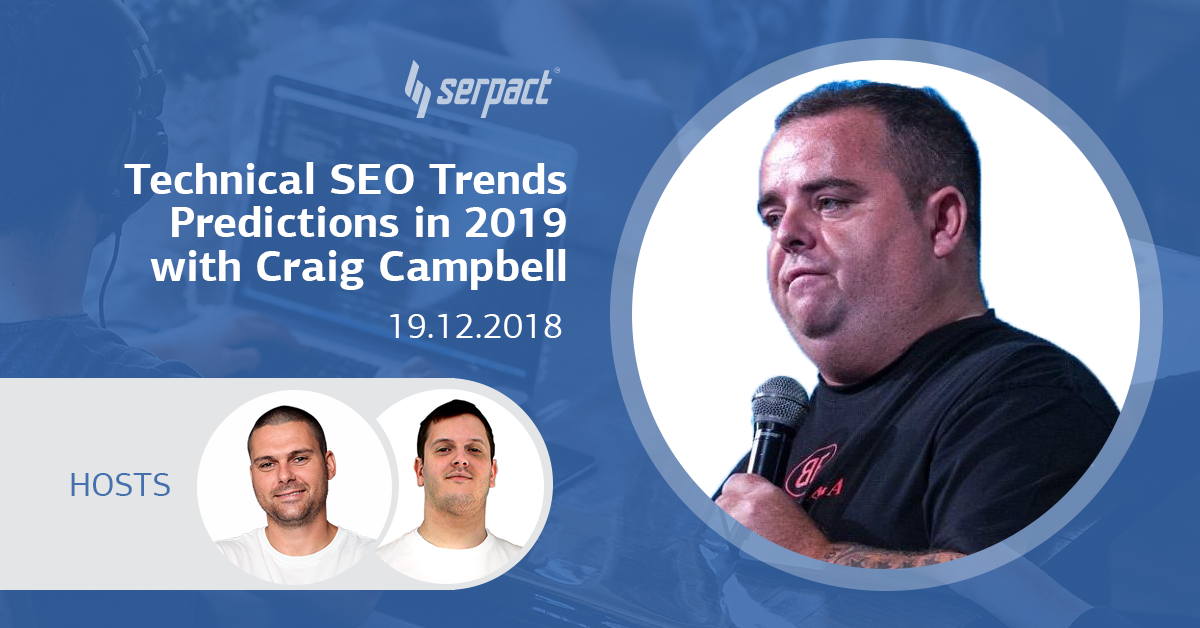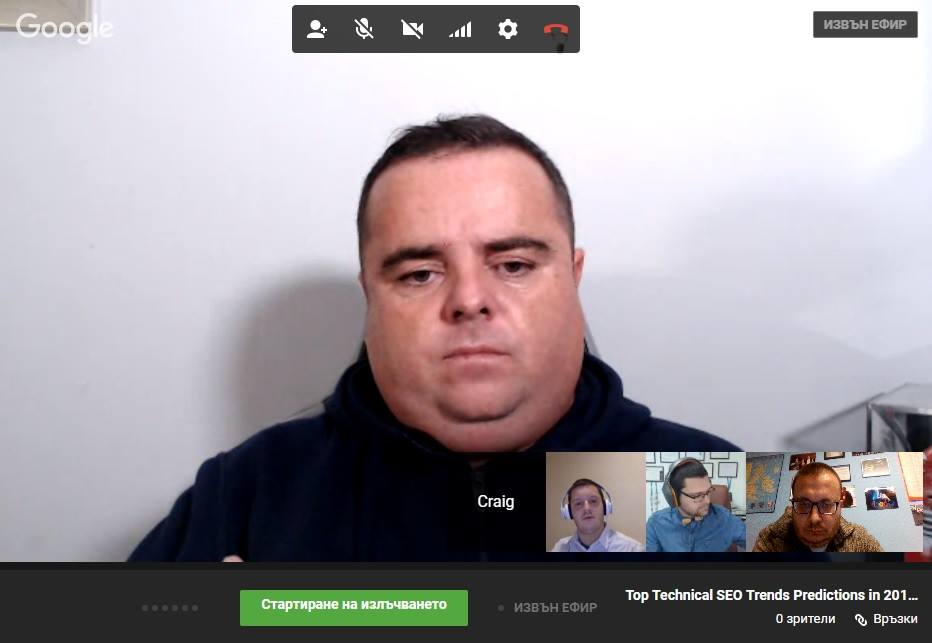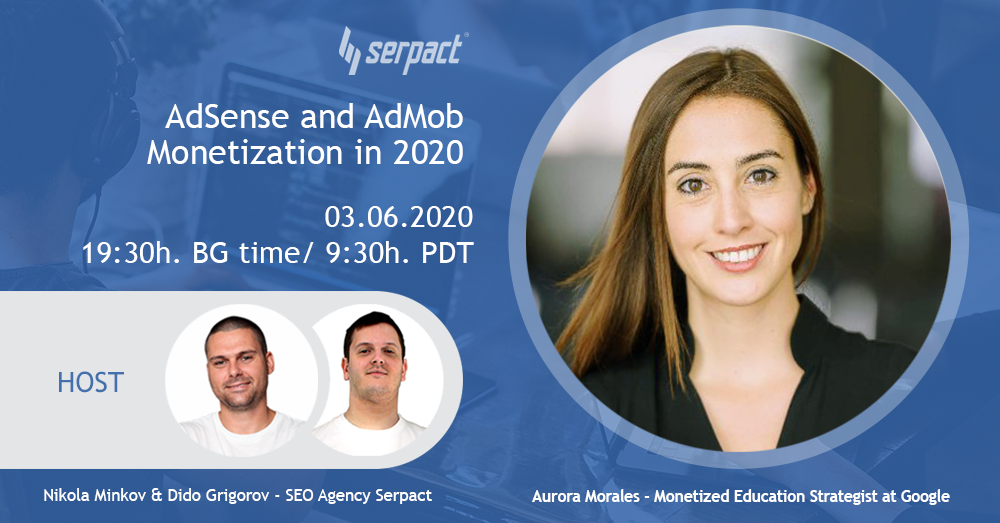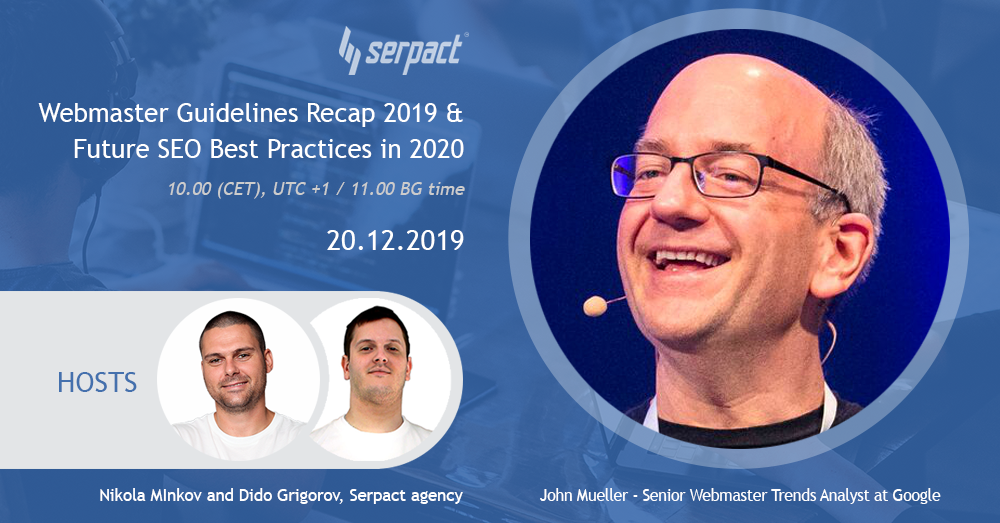Webinar recap: Top Technical SEO Trends Predictions in 2019 with Craig Campbell

Today we are reviewing the webinar “Top Tech SEO Trends Predictions in 2019 with Craig Campbell” performed on December 19, 2018, a joint event of SEO agency Serpact and Craig Campbell of Craig Campbell Seo.
You can watch the video here:
Craig Campbell is an SEO expert from Glasgow, with over 17 years of experience. He leads online SEO courses, performs site analysis, link building, consults, and is a frequent speaker of many specialized digital marketing events, some of which are Digital Olympus, London SEO Meetup, SearchLeeds, BrightonSEO, Chiang Mai SEO, DMSSO , Search Norwich, MB Summit Milan.
Let’s get to the webinar itself and the SEO questions we were discussing with Craig.
Dido Grigorov: Hello, Craig! Would you tell us about your SEO development, your career and the state of the SEO market in the UK?
Craig Campbell: Thank you, Nikola, Dido and Boris, for the invitation to participate in your webinar! I’m Craig Campbell and I’m in affiliate marketing right now. I worked in an agency, but I decided to look for freedom, reduce stress, and so on. That’s how I started alone in affiliate marketing. Asking for the English online market, which is 60 million compared to the German, which is 83 million, but in Germany the level and demand for SEO is much lower, while in the UK the market is very competitive, everyone wants to do SEO and working from home.
Dido: Let’s start with our theme – Mobile First Indexing. Now everybody talks about it and worries about what to do. What’s your advice – how to prepare for the Mobile First Index?
Craig: We’ve seen more and more responsive websites lately. If your site has a responsive design there is nothing to worry about. However, the big problem is if you have a mobile version of your site. Many people on their mobile version take off a lot of things to make it lighter. So it becomes much simpler than the desktop version. This can bring you ranking problems.
Dido: Yes, the availability of a mobile version is like a second site, de facto you have two sites and for the mobile you have to think about a new strategy, a new structure, and at all – to put a separate job. Craig, are you expecting new changes to mobile search, content changes, structure, and more?
Craig: You have to give Google what it seeks and wants – quality content, light and comfortable structure. Also make changes and tests which work best. It’s hard to say how things will go, but there will be changes and Google will announce them in advance, they will not be tomorrow. You know that switching to a MOBILE index is spoken from a years ago and more. It is important to keep the contents of a good, responsive design, the speed to be good as well.
Nikola Minkov: Craig, we have a question from our Youtube audience. The question is, “What about AMP technology, how do you think it will develop, and what support and popularity it will get in 2019?”
Craig: I know the AMP technology is very fast and loads the sites lightning fast, but I’m not sure if it will get that big spread. I know it has fans, but I personally think AMP sites look bad, and I do not like them very much.
Nikola: Okay, let’s go back to the Mobile First Index. Are you expecting the release of new formats in SERP, such as Featured snippets, Zero results, etc.?
Craig: I like these things – featured snippets, Knowledge graph – they bring more traffic and visibility. But most UK sites do not use schema.org. I always welcome the use of this formatting to get featured snippets, rich snippets, and so on.
Nikola: Yes, I agree with you. If you remember my slides from Milan – I showed 24 featured snippets then achieved by us. And they really carry a lot more traffic.
Craig: Yes, they also increase the CTR, which indirectly affects SEO. These featured snippets, which do not cost me more money, but increase my traffic and my CTR, I have to be crazy not to do it. People are lazy and featured snippets are easier for use.
Nikola: Craig, what is the current state of UK websites regarding the Mobile First Index?
Craig: Many people come to me for analysis and advice. I have seen really many bad sites. At least 60-70% of sites have old designs from 2012, for example. However, it depends on the business niche – some businesses like finance, or lawyers have newer and more modern sites. And there are businesses without a site at all. I’ve seen people talk to local clubs about featured snippets, how to get it, they do not know much about it.
Although this is UK, there are many people who do not know about it, they do not understand it and confuse SEO with CEO. People who deal with SEO, many of them just pour a lot of content without making their site faster or without doing other technical stuff. There are cases where their SSL does not work well or they have copied content.
Dido: What is the UK trend – a responsive or mobile version of the site?
Craig: Response, definitely. This is the trend.
Dido: Are there people who are more likely to have a mobile version of their website?
Craig: Not really, I’ve seen some, but they’re a bit, maybe I’m a lucky guy!
Dido: Question from our moderator: How do you recommend testing a site – on a real smartphone or with a simulator, on your computer?
Craig: I recommend both. I’m looking at the simulator, the programmer as well, but when the site goes to the client, he watches his site on a real phone. And because the simulator does not always display everything 100% true, it should be tested for both.
Dido: What is the most common problem in a site you meet, talking about Mobile First? We see problems like elements that are very close to each other, wrong viewport, etc?
Craig: There are differences from a website to a web site, but the viewport is a common problem.
Dido: I think viewport problems are often with people who want to use some javascript code for an ad (for example, AdSense) on different screens. What do you think about that?
Craig: AdSense code is not as common a problem as I think it’s normal for people to want to make money from an ad, but they have to optimize this correctly according to the type of screen and device.
Nikola: Craig, are you using the Lighthouse tool to analyze a site? Can you recommend it for Mobile First Index analysis or for any basic analysis?
Craig: Yes, I use it. Lighthouse is one of the most commonly used analysis tools. But there are many other tools in the market that have good opportunities.
Nikola: We move on to our second part, technical SEO. What is the most important technical SEO parameter you recommend for site analytics? And what new things do you think will appear in 2019, can you predict anything?
Craig: (Laughs) I would recommend paying attention to duplicate titles, broken links – these are important things but easy to fix. We encounter these problems quite often, and they are fixable, especially by using tools such as SemRush. Unfortunately, people usually ignore technical SEO, but although these are basic things, they need to be repaired.
Nikola: Why crawling, rendering, crawl rate, and crawl budget have become so important lately and we talk a lot about them, what is your opinion?
Craig: Crawling and Crawl Budget are very important because they give information how Google crawls your site and then your site appears in the Google index.
Nikola: What do you think about broken internal links – can they spoil our strategy?
Craig: Yes, definitely. Internal links carry a lot of traffic and if they are broken, your traffic drops significantly. Also damaged internal links leave the feeling of a low-quality site.
Nikola: Why SSL certificates are still problematic, do you think? And will it be a problem next year?
Craig: They will be a problem for another 5 years! (Everybody laughs.) People do not understand that this is important and needs to be corrected. Even when we have a properly installed SSL certificate, a lot of links link to the http version of the site, which is wrong and is a problem. This is either laziness or ignorance, and they wonder why they do not see a green padlock in the address bar. But no apologies for it, it needs to be corrected. It is important.
Dido: Share us your opinion on Page Speed Insight / PSI / Tool – Google has updated it quite quietly?
Craig: I’m using Gtmetrix and Pingdom, it’s very exhausting to try to get 100 out of 100 on Google Page Speed Insight. My site is currently 76/100.
Nikola: Do you use Schema.org mark-up and do you think it is effective?
Craig: I’m pretty lazy and I have not used it on my site, but it has many benefits for client sites. The mark-up scheme does not cost you anything, it brings you more traffic, better CTR and you have to be crazy to not use it. Even I intend to implement it soon.
Nikola: Do you think the schema mark-up is linked to featured snippets and the schema.org mark-up will help us make featured snippets easier?
Craig: Of course!
Dido: What is the status with image optimization in the UK – image size, ALT tags, and the like?
Craig: There are many image sites in the UK, and this is a challenge for their speed. But making pictures well is not difficult, so it will be crazy not to do that. And a little action will have a big effect.
Dido: There is a lot of talk about the so-called Orphan pages – how can we improve their performance – with internal inventory or otherwise, to improve their indexing?
Craig: With SemRush, we can find orphan pages and improve their performance by linking them. Some people – if they think that this page is not valuable, they redirect it to another more useful page.
Dido: Do you think the better UX is associated with a better ranking?
Craig: I’m 100% sure of that! Keeping people longer on your site leads to a better CTR and improves your rankings. That’s why it’s important to keep your site simple and easy to use. Not only from SEO point of view, but also to be user-friendly.
Thank you, guys for the invitation, and congratulations on doing a webinar in a language that is not your mother tongue!!
Serpact: Thanks to everyone for attendance and questions!






